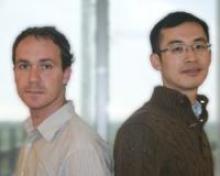
The small-scale, cutting-edge work of graduate student Eric Josephs and chemistry Professor Tao Ye is providing an up-close look at the behavior of biomolecules.
The two UC Merced researchers hope to help engineer new and better biosensors for medical uses. Now, a paper documenting some of their research has been published in Nano Letters, one of the most-respected journals in nanoscience and technology.
Ye, an assistant professor in the School of Natural Sciences, and Josephs jointly wrote “Electric-Field Dependent Conformations of Single DNA Molecules on a Model Biosensor Surface.” Josephs is the lead author.
“This is definitely a great accomplishment for him,” Ye said.
The paper showcases one aspect of research aimed at developing faster and more sensitive biosensors, which are used to diagnose diseases and other conditions. Blood glucose meters are an example.
In part, researchers need to understand and control biomolecules on sensors at the nanometer scale — one billionth of a meter. Ye and Josephs use an atomic-force microscope to study and take images of surface-anchored DNA molecules often used to capture specific biomarkers, molecules that may signal diseases.
Because the molecules are moving, they are difficult to see clearly.
“It’s like taking a picture of a car zooming by,” Ye said.
Ye and Josephs have developed a way to temporarily pin the DNA molecules to surfaces so that the molecules can remain stationary when images are taken.
With images so sharp that even individual molecules can be seen at work, researchers can begin to understand how a biosensor captures and detects specific biomarkers, such as a protein, and create more sensitive and reliable biosensors.
Josephs, who enrolled at UC Merced in 2008, said he wanted to study at the University of California’s newest campus. He’s working toward a Ph.D. in bioengineering and small-scale technology.
“It’s like a startup here,” Josephs said. “All of the professors are young and have lots of ideas.”
Any challenges of a new campus come with opportunity. For example, Josephs said he rarely had to share the atomic force microscope during his first few years at UC Merced.
Josephs, originally from Los Angeles, earned two bachelor’s degrees — in biomedical engineering and electrical engineering — from Duke University. He hopes to complete his doctorate in 2013 and then land a job as a researcher in a national or private laboratory.
Josephs said working with Ye has improved his ability to think independently.
“He’s helped me develop myself as a scientist in addition to being an engineer,” he said.
Originally from China, Ye came to the U.S. to study at the University of Pittsburgh. He earned a Ph.D. in chemistry and performed post-doctoral work at Penn State.
Ye, who arrived at UC Merced in 2007, said he chose the campus partly because he wanted to pursue interdisciplinary research. The UC system’s success at growing new campuses was another draw.
“The University of California has a track record of building research campuses from scratch,” he said.



